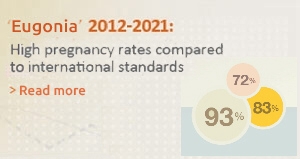OHSS is a serious complication of ovarian stimulation in IVF. It can be mild, moderate or severe, depending on the severity of symptoms. Symptoms include abdominal distension, stomach ache, vomiting, increase of body weight and reduced urination. Moderate OHSS occurs in 3-6%, while severe OHSS occurs in 0.2-1% of women undergoing IVF. Mild OHSS lacks clinical significance, while severe OHSS includes fluid accumulation in the third space, increase of ovarian volume, hematocrit, white blood cells and liver indices. More rarely in critical forms there might be breathing difficulty, fainting and abnormal hematological and biochemical markers. In this case hospitalization is necessary.
Risk factors for the development of OHSS include young age, low body weight, high gonadotrophin doses, previous OHSS history, high dose of hCG and polycystic ovaries.
Women with polycystic ovaries are at greater risk for developing OHSS (9-38%). This variation is mainly due to the lack of a universal classification system of OHSS.
OHSS is caused by the exogenous hCG administration in the presence of a large number of follicles (more than 20).
OHSS develops 3-7 days after oocyte retrieval (early onset), or can be pregnancy-induced, 12-17 days after oocyte retrieval (late onset).
The pathophysiological cascade of events is as follows: Ovarian stimulation using exogenous gonadotrophins is followed by multiple follicle development. Administration of hCG to trigger final oocyte maturation causes massive luteinization. Secretion of angiogenic factors, such as VEGF, by the multiple corpora lutea leads to increased permeability of blood vessels and shift of fluid to the third space. The clinical evidence of OHSS is the presence of ascites.
A subsequent pregnancy is not threatened by OHSS. But pregnancy can further induce the symptoms of OHSS.
OHSS can be prevented and treated
Accurate prognosis, active prevention and drastic treatment form an effective approach for the management of OHSS. The scientific team of Eugonia has a long experience and accumulated knowledge on risk factors and prevention of OHSS, as shown by our everyday clinical practice, and also our published studies in international journals. Our earlier studies are related to OHSS prevention (using methylprednisolone) or the use of GnRH antagonist protocols. Our latest studies report a novel treatment of established severe OHSS, which is a safe and effective solution that can change the philosophy of OHSS management.






























